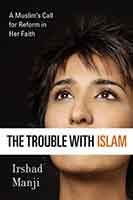Islam isn't all right.

The Trouble with Islam: A Muslim's Call for Reform in Her Faith
Irshad Manji
ISBN: 0312326998
St. Martin's Press, 2010-04-01
English
A tour de force of contemporary Islam - what is wrong with it, why it ended up that way, and most important: what can be done about it. (5/5)
The second largest faith in the world has problems. Its followers rank among the poorest, the most illiterate, the most backward, the most unhealthy, the most unenlightened, the most deprived, and the weakest of all the human race
[1]. And it's not improving.
In this book, Irshad Manji, a Canadian Muslim from Uganda with roots in Egypt and India, encourages the followers of Islam to take a critical look at their religion; demanding an answer to how they got stuck, and why they cling to traditions that don't lead them where they want to go.
The book starts with Irshad stating her casus belli, before moving on to a chapter describing her journey from young Muslim to "Muslim Refusenik". It then analyzes different aspects of contemporary Islam:
The claimed perfection of the Quran.
The lack of critical thinking.
The Israeli-Arab conflict.
The tribal structure of the global Muslim community.
The book then proceeds to describe solutions to the issues. It is this that sets Irshad's book apart from the usual fare: It is that it really is a call for reform, not a call to chuck the whole religion overboard, nor an apology for Islam.
Yes, in a global world, we non-Muslims are also part of the problem, and the book points out how "the West" can help, or at least stop hindering, the growth of a better, more vibrant, Islam. However, it is made clear that the responsibility to create a new Islam, and the responsibility for the heavy lifting required to implement it, is something that lies with the Muslims. Blaming "the West" for all the ills of Islam is utterly ruled out.
The result is a book that is incredibly refreshing and inspiring, even for an atheist like me. I have held that the dividing line isn't between Muslims and non-Muslims, but between those who share our values of freedom and democracy, and those who want to impose oppression and theocracy.
But it is not enough to have that general idea in place. I still stand by it, but it is pitifully little. It is more of a fond hope than a fully constructed framework that can be used in practice. In order for one to be effective, one must understand the environment in which one is operating. In this case, it means understanding from where Muslims come, it means understanding what arguments the theocrats will deploy against you, and it means understanding how the reformation works. For example:
...where does sharia - the Islamist law - come from? Turns out it isn't divinely inspired.
...what right do I have to criticize Muslims? All the right in the world - after all, I live on this planet, too.
...what societal structures keep Muslims back? Their families, it turns out.
...how much are they held back? Both a lot and a little. The family can be very repressive, but if something can be shown to more or less mesh with Islam, it is usually green-lit by the family head.
...did Islam conquer the tribal society that preceded it? Not quite.
...what can the West do to help? A lot. Much of which is to stop obstructing, even if we mean well.
In this sense, the book was a treasure trove of information. It is well structured, full of quotable material, and shows an great inside view of part of contemporary Islam.
I'll finish this review with some links for further reading. I'm sure you'll find them as interesting as I do:
Interfaith marriage blessing[a]: Muslim women marrying non-Muslim men have been controversial events among Muslims. It is also a topic Irshad has been engaged in.
A reformist Quran[b]:
A progressive, 21st-century translation -- in English.
[*][c]Faith Without Fear[d]: A discussion guide on the topic of helping better one's community.
Mullah malpractise[e]: Keeping mullahs honest by malpractise suits. While not a serious proposition, it makes too much sense to be a joke.
Innovation and Creativity in Islam[f]: A position paper on the concept of "ijtihad", or independent thinking, in Islam.
While slightly off-topic, I must also mention Ijtihad.org[g], a website by Dr. Muqtedar Khan with many good articles on Islamic reform and world affairs.
There is another edition of this book with the title The Trouble With Islam Today. I assume this change is to better reflect the intention of the author, making the troubles not seem inherent. I haven't found any other differences besides the title and as far as I can tell, this review is applicable to that edition as well.